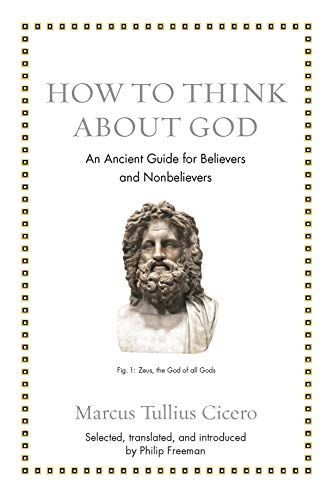
How to Think about God An Ancient Guide for Believers and Nonbelievers
"The majority of Romans were a deeply religious people, though their religion took on forms most of us in the modern world would find unfamiliar. One of the most popular systems of belief among Roman as well as Greek thinkers was Stoicism. Although not strictly a religion Stoicism had many religious aspects including an understanding of the universe as a materialistic, yet continuous and living whole in which Stoics view both the gods and a supreme God as essential elements. This belief system is clearly expressed by Cicero in a central section of his book The Nature of the Gods, a work in which he has different Romans argue various positions on divinity at length. In How to Think about God(s), translator Philip Freeman presents a new translation of this central section which had tremendous influence on religious thinkers (Augustine, Thomas Aquinas, Dante, etc.) for centuries to come. He will also translate Cicero's famous text, The Dream of Scipio, which further articulates the Stoic position on divinity and human immortality. Taking these two fragments of Cicero's corpus of religious writings together, we have a succinct presentation of one of the most influential religious systems of the classical world. Cicero himself varied in his religious beliefs over his lifetime and never wholly embraced Stoicism, but he always admired its teachings and was deeply influenced by them. In these two works he explains fairly and even beautifully the ideas of Stoicism without committing himself to them. How to Think about God(s) is an illuminating illustration of what the key religious thinking was by one of the key religious Roman thinkers at the dawn of the Christian era"--
Reviews
Mirella Hetekivi@euphoricdopamine